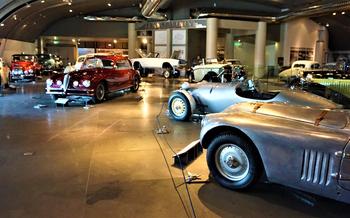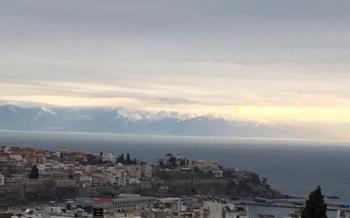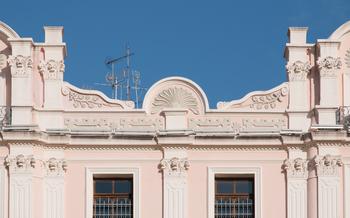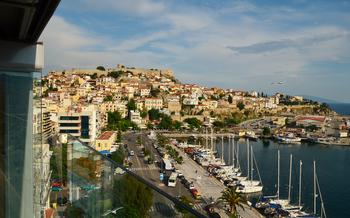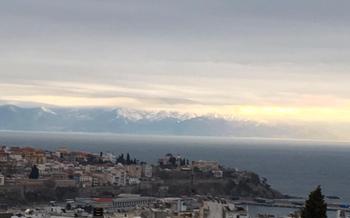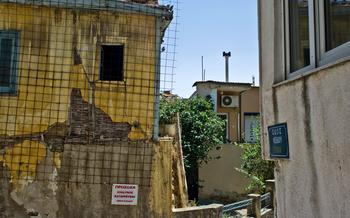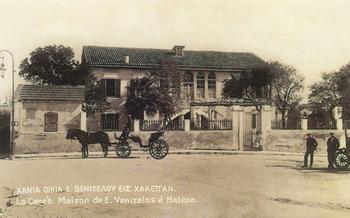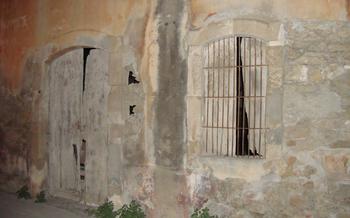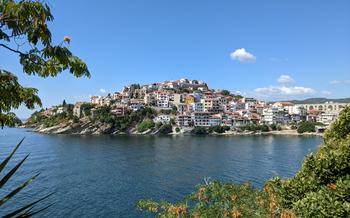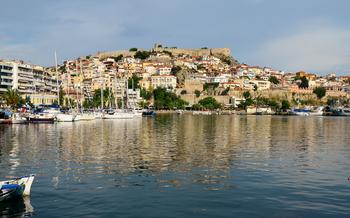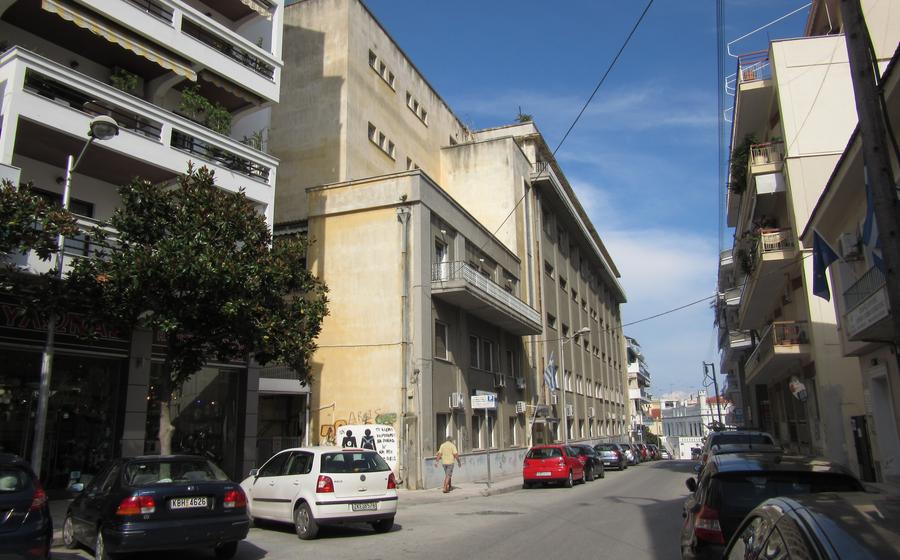
Tobacco Museum
- The History of Tobacco in Kavala
- The Golden Age of Tobacco
- The Tobacco Museum Building
- Museum Exhibits: Tobacco Cultivation and Harvesting
- Museum Exhibits: Tobacco Processing
- Museum Exhibits: Tobacco Trade
- Museum Exhibits: The Social and Cultural Impact of Tobacco
- Temporary Exhibitions and Events
- Guided Tours
- Educational Programs
- Accessibility
- Insider Tip
The History of Tobacco in Kavala
Kavala's tobacco heritage is deeply intertwined with the city's history, economy, and culture. Tobacco cultivation began in Kavala in the late 17th century, when seeds were brought from America by Greek merchants. The plant adapted well to the local climate and soil conditions, and tobacco farming quickly became a major source of income for the city's residents.
By the late 19th century, Kavala had become one of the most important tobacco-producing regions in Greece. The city's tobacco industry flourished, leading to the establishment of tobacco companies and the construction of numerous tobacco warehouses. The wealth generated by the tobacco trade transformed Kavala's urban landscape, with the construction of grand mansions and public buildings.
The tobacco industry also had a profound impact on Kavala's culture. Tobacco cultivation and processing became integral parts of the city's traditions and customs. Tobacco motifs appeared in local art and literature, and the city's annual tobacco festival celebrated the importance of tobacco to Kavala's economy and culture.
The Golden Age of Tobacco
The late 19th and early 20th centuries marked the golden age of tobacco in Kavala. During this period, the city became a major center of tobacco production and trade. The cultivation of tobacco expanded rapidly, and the city's tobacco warehouses and factories bustled with activity. The tobacco industry brought wealth and prosperity to Kavala, and the city's population grew rapidly. The construction of grand tobacco mansions, tobacco warehouses, and other buildings reflected the city's newfound wealth. Kavala's tobacco merchants became some of the wealthiest and most influential people in the city, and the tobacco industry played a major role in shaping the city's culture and society.
The Tobacco Museum Building
The Tobacco Museum is housed in a magnificent building that is itself a testament to the city's tobacco heritage. Originally constructed in 1908 as a tobacco warehouse, the building is an imposing example of industrial architecture. Its red-brick facade and arched windows reflect the architectural style of the late 19th and early 20th centuries, when tobacco was king in Kavala.
The building's size and grandeur speak to the economic importance of tobacco to the city. It was built to accommodate the vast quantities of tobacco that were produced and processed in Kavala at the time. Today, the building serves as a reminder of the city's tobacco past and its transformation into a modern, diversified economy.
Museum Exhibits: Tobacco Cultivation and Harvesting
The Tobacco Museum in Kavala offers visitors a glimpse into the intricate world of tobacco cultivation and harvesting. Through a captivating display of tools, machinery, and interactive exhibits, the museum sheds light on the processes involved in growing, harvesting, and processing tobacco leaves.
Visitors can marvel at the traditional implements used by tobacco farmers, such as wooden plows, hoes, and wicker baskets. The museum also showcases the techniques employed in tobacco cultivation, including seed selection, planting, and irrigation.
A highlight of the museum is the section dedicated to tobacco harvesting. Visitors can learn about the careful process of handpicking tobacco leaves, ensuring that only the finest leaves are selected. The museum also demonstrates the traditional methods of drying and curing tobacco leaves, which are essential for preserving their flavor and aroma.
Through these exhibits, the Tobacco Museum offers visitors a comprehensive understanding of the cultivation and harvesting processes that have shaped the tobacco industry in Kavala.
Museum Exhibits: Tobacco Processing
The Tobacco Museum in Kavala offers an in-depth look at the processing of tobacco, from the sorting and grading of leaves to the blending and packing of finished products. Visitors can learn about the different machines and equipment used in tobacco processing, as well as the various stages involved in the production of cigarettes, cigars, and pipe tobacco.
One of the most fascinating exhibits is a replica of a traditional tobacco factory, complete with machinery and tools. Visitors can watch as workers demonstrate the different steps of tobacco processing, from sorting and grading the leaves to packing the finished products. The museum also has a collection of vintage tobacco advertisements, which provide a glimpse into the history of tobacco marketing and consumption.
In addition to the permanent exhibits, the museum also hosts temporary exhibitions on various aspects of tobacco culture and heritage. These exhibitions often feature the work of local artists and artisans, and explore the social and cultural impact of tobacco on the community.
Museum Exhibits: Tobacco Trade
The Tobacco Museum in Kavala also showcases exhibits related to the tobacco trade, highlighting the city's role as a major tobacco trading hub. Visitors can learn about the history of tobacco trade in Kavala, dating back to the late 19th century when the city became a major exporter of tobacco to countries across Europe and the Middle East.
The museum displays various documents, photographs, and artifacts that illustrate the processes involved in tobacco trading, such as the negotiation of prices, the transportation of tobacco, and the establishment of trade routes. Visitors can gain insights into the challenges and opportunities faced by tobacco merchants, as well as the impact of the tobacco trade on the local economy and society.
Exhibits on the different markets for Kavala tobacco highlight the global reach of the city's tobacco industry. Visitors can learn about the countries that imported Kavala tobacco, the preferences of different markets, and the role of tobacco in international trade relations.
Overall, the Tobacco Museum provides a comprehensive overview of the tobacco trade in Kavala, shedding light on the city's historical significance as a major tobacco trading center.
Museum Exhibits: The Social and Cultural Impact of Tobacco
The Tobacco Museum in Kavala not only showcases the history and processes of tobacco cultivation and trade but also delves into the profound social and cultural impact that tobacco has had on the city and its people. Through engaging exhibits, visitors can explore how tobacco has shaped local traditions, customs, and even the arts.
Tobacco played a crucial role in the daily lives of Kavala's residents. It was a source of income, a topic of conversation, and an integral part of social gatherings. The museum highlights this social significance through displays of traditional tobacco-related tools and objects, such as ornate pipes, intricately carved snuff boxes, and colorful tobacco pouches.
The museum also sheds light on the cultural impact of tobacco. Visitors can admire a collection of tobacco-themed artwork, including paintings, sculptures, and photographs, which capture the essence of Kavala's tobacco heritage. Literary enthusiasts will find a section dedicated to tobacco-inspired literature, showcasing poems, stories, and novels that explore the themes of tobacco cultivation, trade, and its social implications.
Through these exhibits, the Tobacco Museum offers a comprehensive exploration of tobacco's profound influence on Kavala's social and cultural fabric, providing visitors with a deeper understanding of the city's unique tobacco legacy.
Temporary Exhibitions and Events
The Tobacco Museum hosts a dynamic program of temporary exhibitions and events that delve into various aspects of tobacco culture and heritage. These exhibitions and events showcase the museum's rich collection of artifacts, documents, and photographs, offering visitors a deeper understanding of the role of tobacco in Kavala's history, economy, and society.
Temporary exhibitions often focus on specific themes related to tobacco, such as its cultivation, processing, trade, or cultural significance. These exhibitions feature unique artifacts, interactive displays, and multimedia presentations that bring to life the stories and experiences of tobacco growers, merchants, and consumers.
In addition to exhibitions, the museum organizes events such as lectures, workshops, film screenings, and guided tours that explore different aspects of tobacco culture. These events provide opportunities for visitors to engage with experts, learn about the latest research, and participate in hands-on activities related to tobacco.
The museum's temporary exhibitions and events play a vital role in promoting tobacco culture and heritage and encouraging dialogue and understanding of its impact on Kavala and beyond.
Guided Tours
Enhance your museum experience by booking a guided tour, an excellent way to delve deeper into the captivating world of tobacco. Knowledgeable guides will lead you through the museum's exhibits, providing insights into the history, cultivation, processing, and cultural significance of tobacco in Kavala. Learn about the intricate techniques used by tobacco farmers, the machinery employed in tobacco processing, and the global reach of Kavala's tobacco trade. Guided tours typically cover specific themes or periods, allowing you to tailor your visit to your interests. Whether you're a history buff, a tobacco enthusiast, or simply curious about this unique aspect of Kavala's heritage, a guided tour will undoubtedly enrich your understanding and appreciation of the Tobacco Museum.
Fees for guided tours vary depending on the size of the group and the duration of the tour. Advance booking is recommended, especially during peak tourist season, to secure your spot and avoid disappointment. Guided tours are available in multiple languages, including English, Greek, French, and German, ensuring that visitors from around the world can fully immerse themselves in the museum's offerings.
Educational Programs
The Tobacco Museum offers a range of educational programs designed to engage and educate students of all ages about the history, cultivation, processing, and cultural significance of tobacco. These programs are tailored to meet the needs of different grade levels and curriculum requirements, and are led by experienced museum educators.
The programs typically include a guided tour of the museum's exhibits, hands-on activities, and interactive discussions. Topics covered may include the history of tobacco in Kavala, the science of tobacco cultivation and processing, the social and economic impact of the tobacco industry, and the representation of tobacco in art and literature.
The museum also offers educational workshops for teachers, providing them with resources and strategies for incorporating tobacco-related topics into their classrooms. These workshops cover a variety of topics, such as the history of tobacco, the science of addiction, and the role of tobacco in popular culture.
The cost of educational programs and workshops varies depending on the size of the group and the program selected. The museum offers discounts for schools and other educational institutions. To book an educational program or workshop, please contact the museum's education department in advance.
Accessibility
The Tobacco Museum is committed to providing a welcoming and accessible environment for all visitors, regardless of their abilities. The museum features ramps, elevators, and other accessibility features to ensure that everyone can enjoy the exhibits and learn about the history of tobacco in Kavala. The museum staff is also trained to assist visitors with disabilities and to make their visit as enjoyable as possible.
Insider Tip
For the best experience, plan your visit to the Tobacco Museum during the spring or fall when the weather is pleasant for exploring the city. After your visit, head to one of the many traditional Greek tavernas in Kavala for a delicious meal. For a unique souvenir, visit one of the local shops to purchase tobacco-related products, such as handmade cigarettes or traditional tobacco pipes.
